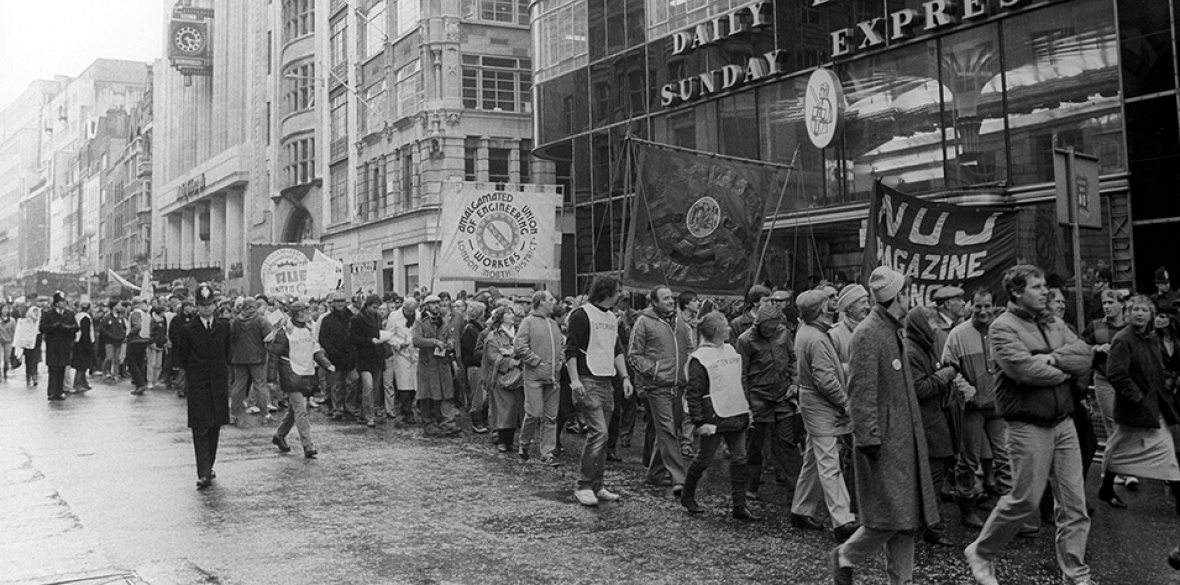This is the last article you can read this month
You can read more article this month
You can read more articles this month
Sorry your limit is up for this month
Reset on:
Please help support the Morning Star by subscribing here
TRADE union themes are at the centre of two events during the 2021 Sheffield Festival of Debate: Trade Unions, Workers’ Rights and the Media tomorrow, May 5, and Wapping: The Workers’ Story on May 12.
Both of them are timely. We saw during March huge publicity about the attempt to organise a union at the Amazon warehouse in Bessemer, Alabama.
Here in Britain, the trade union Unite has just launched a national campaign against the pernicious “fire-and-rehire” tactic used by employers where workers are sacked and rehired on inferior pay and conditions.
Recently 400 British Gas engineers lost their jobs because they refused to sign up to contracts which would have meant longer hours for the same pay.
In Manchester at Go North West’s Cheetham Hill bus depot, over 400 drivers have been out on strike since February 28 in protest at the company’s fire-and-rehire policy.
I’ve written about the Amazon issue before and the US magazine The Nation carried a scathing piece by Jane McAlevey, “Blowout in Bessemer: A Postmortem on the Amazon Campaign,” which came out minutes after the result was announced.
The article was widely shared and criticised, particularly for its attack on one section of media reporting.
McAlevey wrote: “The media, especially the genre of media called the labour media, should have never overhyped this campaign … When media folks prioritise clicks and followers over reality, it doesn’t help workers, and probably hurts them.”
I’ve always rated Steven Greenhouse’s reporting — he was the industrial correspondent (they’re called labour reporters in the United States) for the New York Times until he retired.
His book The Big Squeeze: Tough Times For the American Worker (2008) is there prominently on my bookshelves.
He was one of the targets of McAlevey’s criticism and he took issue with this cheap shot against ground-breaking journalism.
This is what he has to say in a Facebook post about the ballot “Even though some critics have slammed the union for losing the unionisation drive at Amazon, that union drive was in many ways a gift to the larger labour movement:
• The union’s campaign put Amazon on trial worldwide for its harsh treatment of workers.
• It exposed Amazon’s blatant union-busting.
• It got a sitting president to make an extraordinary pro-union video.
• It got the nation to focus more on the need for expanding labour rights.
• It showed that many Amazon workers across the US want a union.
• It stimulated more worker activism at Amazon.
• It even got Jeff Bezos to admit that Amazon needs to treat its workers better.”
There’s another piece by John Logan which covers these points well and also takes up the specific criticism of reporters overhyping the campaign.
He is clear: “The criticism is utterly preposterous: these journalists, and many others, have published meticulously researched and balanced stories that consistently stressed the enormous obstacles the union faced.
“Moreover, their outstanding reporting on the Amazon campaign — which has probably done more to revitalise the ‘labour beat’ than any other single union story — is another great legacy of the campaign, especially the detailed reporting on the actions Amazon took to ‘crush’ the union campaign.”
Media coverage in Britain of trade unions and workers’ rights is the theme of the first Festival of Debate event.
Sarah Woolley, the general secretary of the Bakers’ Union (BFAWU) is speaking.
She is highly respected for her energy and work around campaigns like Sheffield Needs A Pay Rise.
Nick Jones, a former BBC industrial correspondent with wide experience of covering trade unions, is also speaking.
The third speaker is Jim Boumelha, representing the International Federation of Journalists.
Those with long memories will recall the Pergamon strike over union recognition by the National Union of Journalists which lasted from 1989 to 1992.
Boumelha was actively involved in that dispute against the media mogul Robert Maxwell.
Another media mogul, Rupert Murdoch, is at the centre of our second event, featuring the outstanding documentary Wapping: The Workers’ Story. I have reviewed the film and urge people to see it at this event.
There will be a post-film discussion with Paul Routledge, a Wapping “refusenik,” and Ann Field who was at the centre of the Wapping dispute in 1985-6 and played a key role in creating the exhibition and News International Dispute Archive for the 25th anniversary of the strike.
Routledge now writes for the Daily Mirror, but worked for The Times when the Wapping dispute started.
Murdoch is now 90 and has decided to scrap his plans for a Fox-type British News channel but his baleful legacy as a media mogul has been to disseminate globally in his print and broadcast media ideas which have fostered hatred, war and division over six decades.
And through all that time he has been fiercely hostile towards trade unions.
Granville Williams is the editor of MediaNorth. Find out more about its work at: medianorth.org.uk.
To register for the Trade Unions, Workers’ Rights and the Media event visit mstar.link/UnionsRightsMedia and to register for the Wapping event visit mstar.link/WappingWorkersStory












